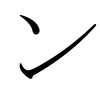N (kana)
(dialihkeun ti ん)
ん, in hiragana, or ン in katakana, is one of the Japanese kana, which éach represent one mora. It is the only kana sound ending with a consonant.
 |
 |
| kana - gojūon | |||||||||||
|---|---|---|---|---|---|---|---|---|---|---|---|
| ん | わ | ら | や | ま | は | な | た | さ | か | あ | |
| っ | (ゐ) | り | み | ひ | に | ち | し | き | い | ||
| ヴ | る | ゆ | む | ふ | ぬ | つ | す | く | う | ||
| ヶ | (ゑ) | れ | め | へ | ね | て | せ | け | え | ||
| ー | を | ろ | よ | も | ほ | の | と | そ | こ | お | |
This kana is unique in several aspects; it can never begin a word and is followed by an apostrophe in transliteration whenever it precedes a vowel or a y- kana, so as to prevent confusion with other kana. But like every other kana, it represents an entire mora - and so its pronunciation is, in practice, as close to 'nn' as 'n'. Also, when preceding any kana that begins with an "M," "B," or "P," sound, this kana can become an "M" sound.
| Bentuk | Rōmaji | Hiragana | Katakana |
|---|---|---|---|
| Normal n (ん) | n | ん | ン |
| nn nh |
んん んー |
ンン ンー |
| Artikel ieu mangrupa taratas, perlu disampurnakeun. Upami sadérék uninga langkung paos perkawis ieu, dihaturan kanggo ngalengkepan. |
